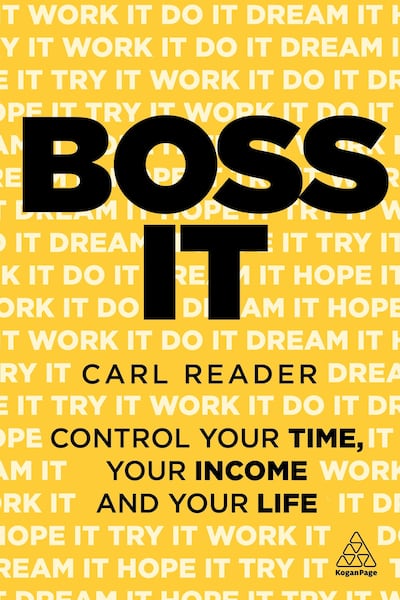Writing a book about how to become your own boss could not have come at a better time for British author Carl Reader.
Britain's unemployment levels rose above 4 per cent in the second quarter of this year mirroring economies across the globe and forcing many to reassess how they earn an income. Fears that jobless rates will escalate further amid rising coronavirus cases means Reader's new book Boss It, set to be published on October 3, has never been more relevant.
Reader finished writing the guide to setting up your own business and taking control of your time, income and life in February when the coronavirus was still considered an issue “happening elsewhere” rather than something countries outside China needed to fret about.
By the time he received the manuscript back for an edit a few months later, however, the world had changed dramatically.
"It's quite unbelievable to think how much of an impact coronavirus has had in such a short time," Mr Reader told The National from his home in Berkshire in the UK.
“The book had all sorts of mentions about face-to-face networking, which no longer applied. It meant that the editing process was quite crazy.”
Reader wrote a new foreword in July that acknowledged the world had “turned on its head” since he first penned the book. “As we get back into normality, this book has never been more relevant."
A return to normality may take some time as Britain's movement restrictions were tightened and the chancellor of the exchequer Rishi Sunak was forced to issue a new rescue plan for jobs and businesses to help prop up the economy through the winter. Elsewhere, economies across the globe are facing up to the reality that coronavirus is here to stay for the foreseeable future.
Reader is well-placed to present Boss It to the world, having started working life on a government Youth Training Scheme (YTS) earning an extremely low weekly wage, at a time when Britain was beginning to emerge from bleak years of crippling recession and high unemployment.
The general message in Reader's book to find the confidence to go-it-alone still applies, not only for those facing job loss who want to take charge of their employment situation but also for existing business owners who are now having to restart, evolve or rebuild their venture.
For people that have lost their jobs, “self-employment is a real opportunity”, says Reader, 39, whether by choice or necessity.
"While some will look to self-employment as a way to make ends meet … as we pull through the recovery stage ... companies will look to replace a fixed workforce with a more flexible workforce."
While Reader concedes that some professions lend themselves more easily to self-employment, he adds that the education system is to blame for deterring school leavers and university graduates from starting up on their own.
“Business studies tends to focus on share price valuations and big corporates,” he says. “It doesn't actually focus on the fact that business is potentially for the average student. Read the business pages in the media and you will see stories about share prices and what's happening at companies like Vodafone rather than focus on the business owner who might live next door to you.”
With one in seven adults now self-employed in Britain, Reader says the disconnect between the narrative around business and the reality "leads to a position where there’s no real information or guidance for those looking to set up and people think ‘business ownership isn’t for the likes of me’”.
The father-of-five points to his eldest son, who at 21 has started up a voice-over business despite being told he was average at school and the only way he could succeed in life was to get a degree.
“It was really quite inspiring to see that he made the choice to actually explore his passion. He really enjoyed podcasting and did it as a hobby and he had no idea that he could translate his personal passion into a business,” says Reader.
Reader's own career journey is somewhat uncoventional. As a teenager, he started working as a hairdresser on a government YTS earning £31.50 (Dh147.69) a week. "It was slave labour," he says.
He ditched the job to become a supermarket shelf stacker while he sat his GCSEs, later falling into accountancy and setting up his own business d&t that now runs itself with him as joint chairman.
He is also the chairman of the Practitioners Panel at the Association of Chartered Certified Accountants and an ambassador for IPSE, the trade body for the self-employed.

A regular TV commentator on small businesses, Reader is set to speak at a Middle East webinar on October 13 on behalf of The Global Franchise Market to discuss driving European franchises to the Middle East.
Boss It makes the point of distinguishing between self-employment and running a business, suggesting the best way to differentiate between the two is "whether the business could proceed without the owner being involved in the business every day". between self-employment and running a business with the easiest way to differentiate between the two is "whether the business could proceed without the owner being involved in the business every day".
“If the owner is an integral part of the purpose and day-to-day running and the business would fall apart without them, then that person is self-employed,” Reader says, adding that not everybody “wants to start a scalable business".
Of the 5.5 million business in the UK, 76 per cent have no employees and 94 per cent of those operate from a single site such as a home office or that of a contractor, the book finds.
“In other words, it is completely possible to ‘be your own boss’ while not actually being a boss at all and working instead for a corporate contractor,” it says.
The book guides readers from the dreaming and planning stages of setting up a business to how to raise funds, take the first key steps, build systems and processes, find customers and then scale the business – for those that want to scale, of course.
But what factors do you really need to become your own boss?
The first thing you need is to be comfortable with the idea and ensure you have the knowledge to set up a business, Reader says. The second is to create and follow a business plan, find customers, review your strategy and find what works and what doesn’t. Finally, you need to be comfortable in your own skin.
"What I mean by that is not all of us are cut out to be global entrepreneurs. We've all got a different level within ourselves and we've got a different place in our business where we bring the most impact," he says.
Opening a business in such an uncertain climate may seem unrealistic but Reader says he has seen gyms and food and beverage concepts start up during the crisis and is heartened to see how local businesses have benefitted from the community spirit spreading throughout the country.
"I've found I'm shopping locally rather than with national chains, because it's helping to keep them afloat," he says. "But local businesses are also being far more adaptable and flexible - it's been great to see pubs and restaurants do takeaways and deliveries."
Reader himself is publishing a book at a time when no launch events can take place and he has had to abandon a promotional tour of the US, forcing him to pay heed to his own advice.
“I need to be creative. I’m leveraging social media and I'm looking at opportunities or podcasts and webinars and so on,” he says.
One of the key characteristics business owners must have is confidence, Reader says. However, he stresses that people need to do their homework before they set up.
“I’m a big believer that business isn’t complicated but it’s also not easy,” he says.
As well as understanding the basics, owners must prepare themselves for the reality that they are not necessarily going to escape the rat race.
“Almost all self-employed individuals end up in a rat race of their own and many business owners do too.”
* Boss It, published by Kogan Page, will be available from Ocotober 3 for £14.99 on Amazon



